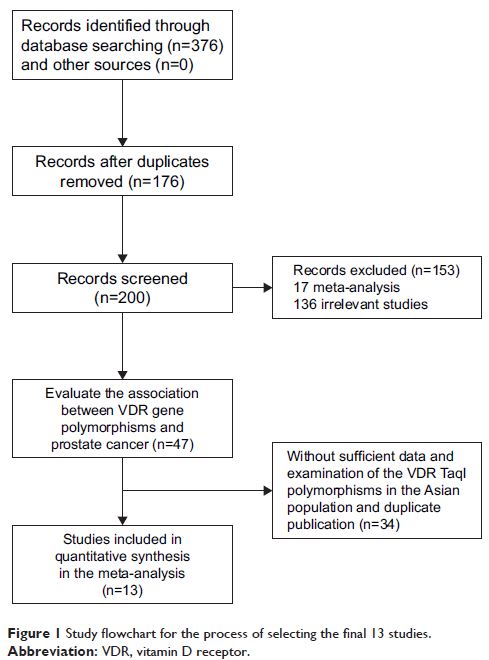108384
论文已发表
注册即可获取德孚的最新动态
IF 收录期刊
- 3.4 Breast Cancer (Dove Med Press)
- 3.2 Clin Epidemiol
- 2.6 Cancer Manag Res
- 2.9 Infect Drug Resist
- 3.7 Clin Interv Aging
- 5.1 Drug Des Dev Ther
- 3.1 Int J Chronic Obstr
- 6.6 Int J Nanomed
- 2.6 Int J Women's Health
- 2.9 Neuropsych Dis Treat
- 2.8 OncoTargets Ther
- 2.0 Patient Prefer Adher
- 2.2 Ther Clin Risk Manag
- 2.5 J Pain Res
- 3.0 Diabet Metab Synd Ob
- 3.2 Psychol Res Behav Ma
- 3.4 Nat Sci Sleep
- 1.8 Pharmgenomics Pers Med
- 2.0 Risk Manag Healthc Policy
- 4.1 J Inflamm Res
- 2.0 Int J Gen Med
- 3.4 J Hepatocell Carcinoma
- 3.0 J Asthma Allergy
- 2.2 Clin Cosmet Investig Dermatol
- 2.4 J Multidiscip Healthc

通过更新的系统荟萃分析来评估 VDR 基因 TaqI 多态性与亚洲人群前列腺癌易感性之间的关系
Authors Chen L, Wei J, Zhang S, Lou Z, Wang X, Ren Y, Qi H, Xie Z, Chen Y, Chen F, Wu Q, Fan X, Xu H, Huang S, Weng G
Received 6 September 2017
Accepted for publication 27 March 2018
Published 31 May 2018 Volume 2018:11 Pages 3267—3280
DOI https://doi.org/10.2147/OTT.S151002
Checked for plagiarism Yes
Review by Single-blind
Peer reviewers approved by Dr Amy Norman
Peer reviewer comments 3
Editor who approved publication: Dr Yao Dai
Background: The vitamin D receptor (VDR) plays a key role in vitamin-mediated
signaling pathway. Emerging evidence has suggested that the VDR polymorphism
may contribute to the risk of prostate cancer (PCa). However, the existing
results are not conclusive in Asian population.
Methods: We aim to evaluate the potential role of VDR polymorphisms on PCa
of Asian population. PubMed, Scopus, Embase, Web of Science, Chinese National
Knowledge Infrastructure, Wang Fang Data, and VIP Periodical were retrieved,
and eligible studies (case–control or cohort study) meeting the inclusion
criteria were evaluated through an updated meta-analysis using Stata13.0
software.
Results: A total of 1,363 cases and 2,101 controls obtained from 13
eligible publications were eventually included in this meta-analysis. Our
results show that a significant association of VDR taq1 polymorphism with PCa
risk, especially in the Japanese population. In the clinical stage-stratified
analysis, the pooled results revealed no significant difference in genetic
polymorphisms between the local stage and control groups, whereas there was
increased frequency of T allele and TT genotype in the advanced tumor stage
group compared with local tumor stage or control groups. Similarly, no
significant difference was seen in Gleason <7 and control groups, but the T
allele and TT genotype were significantly higher in the Gleason ≥7 group
compared with Gleason <7 or control groups.
Conclusion: The VDR TaqI polymorphism might be associated with PCa risk in
Asian population, especially in the Japanese population. Also, PCa patients
carrying the T allele or TT genotype were more likely to progress to advanced
stage. These results suggest that VDR TaqI polymorphisms may be potential
diagnostic biomarkers for PCa susceptibility.
Keywords: vitamin D receptor, polymorphism, prostate cancer, clinical stage,
meta-analysis
